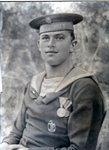Sunday, November 6, 2011
Afterword
Franz Strobl was 22 when he returned home from the war. Although a very young man by any standards, he had seen more than most of us will in a lifetime. He was happy to be home and made no significant journeys for the balance of his life. I look back at my life at 22 and wonder how a young man can possibly survive the live he described on the bits of paper he carried with him. I only knew him as an old man and he was kind-hearted, quick of wit and a tease with a warm sense of ironic humor. When I contemplate that, apart from my parents, he was my closest relative, I'm frustrated that we didn't get to know each other better.
Subscribe to:
Post Comments (Atom)


3 comments:
Stirring diary entries from almost a century ago; a vivid portal into the harsh realities of wars fought by youth, and for what? “Cui bono?” Good job, Pete Strobl! Hope it comes out in book form as a historical document you preserved for us.
I have no words to express how remarkable this story is. Thanks to Franz for living and writing; and thanks to Pete for sharing.
This was fascinating in a number of ways, not just learning about the history or what things were like to fight in a war 100 years ago, or what the technology in the early submarine era was like, but that the enemy soldiers were mostly just poor devils taking orders & trying to protect their homeland, and the detail really puts you there. I thought it was quite well written & translated - one wonders between his ship going down and his diaries later being torn to shreds, how any of this even survived? (seems a miracle) I am amazed this hasn't been published as a book or made into a motion picture! (if it was, one would hope no embellishments would be added, it doesn't need any!)
One question, how badly injured was he from the explosion? It seems like he was in the hospital an awful long time. Did his stomach ever heal, etc.? I wish there was more to the story after he returned home.
Post a Comment